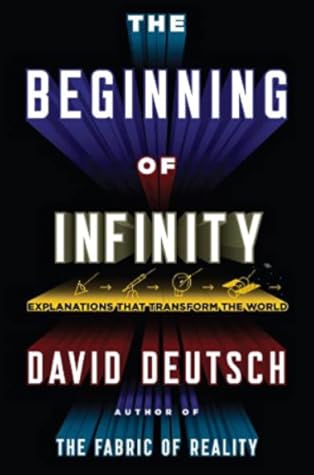More on this book
Community
Kindle Notes & Highlights
Read between
February 16 - March 4, 2019
People want to understand the world, no matter how loudly they may deny that. And progress makes bad ...
This highlight has been truncated due to consecutive passage length restrictions.
As a matter of logic, it would still be open to him to say, ‘I’m not seeing atoms, I’m only seeing a video monitor. And I’m only seeing that theory’s predictions about me, not about atoms, come true.’ But the fact that that is a general-purpose bad explanation would be borne in upon him.
Bad philosophy is philosophy that denies the possibility, desirability or existence of progress. And progress is the only effective way of opposing bad philosophy.
If progress cannot continue indefinitely, bad philosophy will inevitably come again into the ascendancy – for it will be true.
Interpretation The explanatory part of a scientific theory, supposedly distinct from its predictive or instrumental part.
Positivism The bad philosophy that everything not ‘derived from observation’
should be eliminated from science.
Logical positivism The bad philosophy that statements not verifiable by obser...
This highlight has been truncated due to consecutive passage length restrictions.
serious problem that has been identified in many decision-making institutions is that they create incentives for participants to lie about their preferences.
If the decision requires thought, then each option must be associated with an explanation – at least a tentative one – for why it might be the best.
To choose an
option is to choose its e...
This highlight has been truncated due to consecutive passage length restrictions.
decision-making is problem-solving, and that without the inspiration phase nothing is ever solved and there is nothing to choose
between.
At the heart of decision-making is the creation of new options and the abandonment or mod...
This highlight has been truncated due to consecutive passage length restrictions.
They have been not outweighed, but out-argued, refuted and abandoned.
During the course of a creative process, one is not struggling to distinguish between countless different explanations of nearly equal merit; typically, one is struggling to create even one good explanation, and, having
succeeded, one is glad to be rid ...
This highlight has been truncated due to consecutive passage length restrictions.
problems can be solved by weighing – in particular, that disputes between advocates of rival explanations can be resolved by creating a weighted average
their proposals. But the fact is that a good explanation, being hard to vary at all without losing its explanatory power, is hard to mix with a rival explanation: something halfway between them is usually worse than either of them separately.
Wishing for something that is
logically impossible is a sign that there is something better to wish for.
the basic condition for a political system to be capable of making sustained progress: Popper’s criterion that the system facilitate the removal of bad policies and bad governments without violence.
they must embody traditions of peaceful, critical discussion – of rulers, policies
The essence of democratic decision-making is not the choice made by the system at elections, but the ideas created between elections.
ex nihilo.
They are choosing which experiments are to be attempted next, and (principally) which are to be abandoned because there is no longer a good explanation for why they are best.
compromise policies
shield the underlying explanations which do at least seem good to some faction from being criticized and abandoned.
Under a proportional system, small changes in public opinion seldom count for anything, and power can easily shift in the opposite direction to public opinion. What counts most is changes in the opinion of the leader of the third-largest party. This shields not only that leader but most of the incumbent politicians and policies from being removed from power through voting.
But in the advanced political cultures of the Enlightenment tradition the creation of knowledge can and should be paramount, and the idea that representative government depends on proportionate representation in the legislature is unequivocally a mistake.


